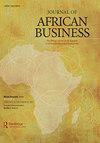小企业成功与失败预测模型
IF 1.8
Q3 BUSINESS
引用次数: 3
摘要
了解中小企业成功与失败背后的原因是一项重要的研究工作。本研究为中小企业(SMEs)开发了一个成功与预测模型。数据收集自毛里求斯的中小企业。结果表明,两种模型均有效可靠,预测精度较高。然而,我们发现完整模型比简化模型有一点优势。资金、财务记录保存和控制、管理经验、业务规划和使用专业顾问是中小企业成功的重要预测因素。讨论了研究结果的理论意义。该研究还为利益相关者提供了实际意义。本文章由计算机程序翻译,如有差异,请以英文原文为准。
A Success versus Failure Prediction Model for Small Firms
ABSTRACT Understanding the reasons behind the success and failure of SMEs is an important research endeavor. This study develops a success versus prediction model for small and medium enterprises (SMEs). Data were collected from SMEs in Mauritius. Both models were found to be valid and reliable and had good prediction accuracies. The full model, however, was found to have a slight advantage over the reduced model. Capital, financial record keeping and control, management experience, business planning and use of professional advisors were significant predictors SMEs’ success. The theoretical implications of the findings are discussed. The study also provides practical implications for stakeholders.
求助全文
通过发布文献求助,成功后即可免费获取论文全文。
去求助
来源期刊

Journal of African Business
BUSINESS-
CiteScore
4.60
自引率
10.50%
发文量
36
期刊介绍:
Journal of African Business is the official journal of the Academy of African Business and Development, the largest network of professionals committed to advancement of business development in African nations. JAB strives to comprehensively cover all business disciplines by publishing high quality analytical, conceptual, and empirical articles that demonstrate a substantial contribution to the broad domain of African business. Regardless of the research context, tradition, approach, or philosophy, manuscripts submitted to JAB must demonstrate that the topics investigated are important to the understanding of business practices and the advancement of business knowledge in or with Africa. Particularly, JAB welcomes qualitative and quantitative research papers. JAB is not, however, limited to African-based empirical studies. It searches for various contributions, including those based on countries outside Africa that address issues relevant to African business. Targeted toward academics, policymakers, consultants, and executives, JAB features the latest theoretical developments and cutting-edge research that challenge established beliefs and paradigms and offer alternative ways to cope with the endless change in the business world. Covered areas: Accounting; Agribusiness Management and Policy; Business Law; Economics and Development Policy; Entrepreneurship and Family Business; Finance; Global Business; Human Resource Management; Information and Communications Technology (ICT); Labor Relations; Marketing; Management Information Systems (MIS); Non-Profit Management; Operations and Supply Chain Management; Organizational Behavior and Theory; Organizational Development; Service Management; Small Business Management; Social Responsibility and Ethics; Strategic Management Policy; Technology and Innovation Management; Tourism and Hospitality Management; Transportation and Logistics
 求助内容:
求助内容: 应助结果提醒方式:
应助结果提醒方式:


